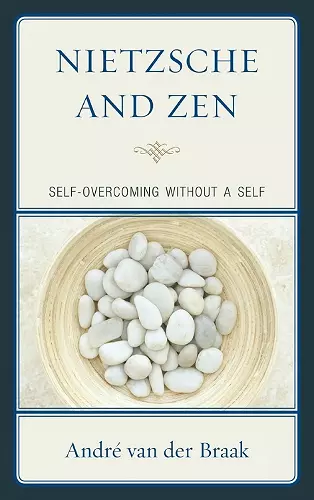Nietzsche and Zen
Self Overcoming Without a Self
Format:Paperback
Publisher:Lexington Books
Published:3rd May '13
Currently unavailable, and unfortunately no date known when it will be back
This paperback is available in another edition too:
- Hardback£98.00(9780739165508)

In Nietzsche and Zen: Self-Overcoming Without a Self, André van der Braak engages Nietzsche in a dialogue with four representatives of the Buddhist Zen tradition: Nagarjuna (c. 150-250), Linji (d. 860), Dogen (1200-1253), and Nishitani (1900-1990). In doing so, he reveals Nietzsche's thought as a philosophy of continuous self-overcoming, in which even the notion of "self" has been overcome. Van der Braak begins by analyzing Nietzsche's relationship to Buddhism and status as a transcultural thinker, recalling research on Nietzsche and Zen to date and setting out the basic argument of the study. He continues by examining the practices of self-overcoming in Nietzsche and Zen, comparing Nietzsche's radical skepticism with that of Nagarjuna and comparing Nietzsche's approach to truth to Linji's. Nietzsche's methods of self-overcoming are compared to Dogen's zazen, or sitting meditation practice, and Dogen's notion of forgetting the self. These comparisons and others build van der Braak's case for a criticism of Nietzsche informed by the ideas of Zen Buddhism and a criticism of Zen Buddhism seen through the Western lens of Nietzsche - coalescing into one world philosophy. This treatment, focusing on one of the most fruitful areas of research within contemporary comparative and intercultural philosophy, will be useful to Nietzsche scholars, continental philosophers, and comparative philosophers.
This is a timely and important book. André Van der Braak does an impressive job of gathering together the variety of comparative work previously done on Zen and Nietzsche and moving the discussion forward in lucid and compelling ways. Nietzsche and Zen does not limit itself to exploring surprising similarities between this provocative European philosopher and this radical East Asian Buddhist tradition; it stages a friendly contest in which their legacies are allowed to join hands and challenge one another to proceed still further down their paths of self-overcoming. -- Bret W. Davis, Professor of Philosophy, Loyola University Maryland
This is the first book-length, scholarly study of Nietzsche and Zen, and it makes an auspicious and constructive start. The research behind the reading of Nietzsche is judicious and comprehensive, and the insights into the Zen ideas come across as informed by practice. Highly recommended. -- Graham Parkes, Professor of Philosophy, University College Cork
We finally have in our hands the first comprehensive philosophical study of Nietzsche and Zen. Andre Van der Braak's Nietzsche and Zen: Self-overcoming Without a Self is a thoughtful meditation on doing intercultural philosophy in a Nietzschean way. Nietzsche ultimately seeks a 'way-knowing' more similar to Buddhism and Daoism than the truth-seeking of his own philosophical tradition. This book situates Nietzsche in an intercultural context that clearly resonates with his own way of knowing. Van der Braak's Nietzsche and Zen is not only much needed—it represents a serious contribution to comparative philosophy. -- David Jones, Kennesaw State University
The great merit of his study lies in bringing together two different positions, one from the West and one from the East; one being a specific thinker, Nietzsche, the other a whole tradition, represented by Nagarjuna, Linji, Dogen and Keiji Nishitani, who did not know of each other (except Nishitani), revealing many parallels and deep relations, which are very helpful in clarifying each other and attest all the more for their validity and value as they come from very different backgrounds and are couched in different languages and styles. * Frontiers of Philosophy in China *
ISBN: 9780739184448
Dimensions: 227mm x 153mm x 19mm
Weight: 349g
250 pages